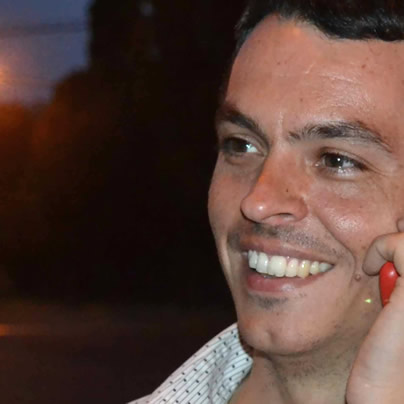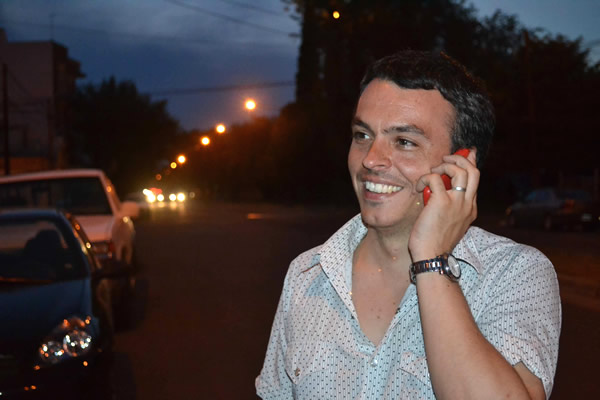World
Argentine gay activist criticizes Pope Francis
Francis led campaign against same-sex marriage in Argentina


Esteban Paulón of the Lesbian, Gay, Bisexual and Trans Federation of Argentina. Photo courtesy of Esteban Paulón.
Argentina’s leading LGBT rights advocate on Wednesday criticized Pope Francis’ strong opposition to marriage rights for same-sex couples.
Esteban Paulón, president of the Lesbian, Gay, Bisexual and Trans Federation (FALGBT,) noted during an interview with the Washington Blade hours after the College of Cardinals elected Francis that he was among the most vocal critics of a same-sex marriage bill that President Cristina Fernández de Kirchner signed in 2010. The new pontiff, who was the-then archbishop of Buenos Aires, described the measure in a letter he wrote to four Argentine monasteries before the country’s Senate approved it as a “machination of the Father of Lies that seeks to confuse and deceive the children of God.”
Francis further categorized the bill as “the work of the devil” that would “spark God’s war.”
“He organized people who mobilized themselves en masse against the equality law and the rights of the collective diversity in moments during which the enormous social and parliamentary consensus that the equality law had in our country was clear,” Paulón said.
Fernández strongly rebuked Francis’ comments.
“It’s worrisome to listen to expressions such as ‘God’s war,’ ‘The work of the Devil;’ things which actually bring us back to the times of the Inquisition, to Medieval Times,” she said while on an official trip to China during the same-sex marriage debate.
The Argentine president further referenced the Crusades as she criticized Francis’ remarks.
“It establishes, as a society, a place which I don’t think any of us wants to have,” Kirchner said. “We are all willing to debate, to discuss, to dissent, but do it within a rational frame without stigmatizing others because they think differently and fundamentally.”
Paulón noted to the Blade that Francis lived in a country in which same-sex marriage has been legal for more than two years.
“This law did not cause any catastrophe, it did not damage the family, it did not cause the destruction of anything,” he said. “It has strengthened families; it has granted rights that have made many people happy.”
Francis, a Jesuit who was previously known as Jorge Mario Bergoglio, was born in Buenos Aires to Italian immigrant parents in 1936.
He became archbishop of the Argentine capital in 1998. Pope John Paul II in 2001 appointed him cardinal.
Francis was also reportedly the runner-up in 2005 when the College of Cardinals elected Benedict XVI to succeed the previous pontiff.
In addition to his opposition to marriage rights for same-sex couples, Paulón noted the new pope also spoke out against Argentina’s law that allows trans people to legally change their gender without sex-reassignment surgery. Francis has also claimed that adoption rights for gays and lesbians in the country constitutes discrimination against children.
The new pontiff has also been outspoken against efforts to allow abortion and in-vitro fertilization in Argentina.
A journalist in 2005 accused Francis of conspiring with the military junta that governed the country from 1976 to 1983 to kidnap two Jesuit priests. Up to an estimated 30,000 Argentines died or disappeared during the so-called dirty war, but Francis in 2010 told a court he actually tried to help the priests and others whom the regime had targeted.
In spite of the controversies, he has reached out to people with HIV/AIDS.
The National Catholic Reporter reported he kissed and washed the feet of 12 AIDS patients at a hospice he visited in 2001. Francis has also defended the poor and the public sector.
“On some issues the church has a discourse of mercy, of piety, of compassion,” Paulón said.
Francis faces criticism from other Latin America activists
Other LGBT rights advocates throughout the region have also criticized Francis, who is the first non-European pope.
“The Vatican and the entire hierarchy of the Catholic church have once again shown indifference at the very least to the human rights of people, electing as their highest representative someone who has stigmatized and offended the love between same-sex couples, calling it a danger to the family, for children and as a move towards the devil,” a spokesperson from the Movement for Homosexual Integration and Liberation, a Chilean LGBT rights group, said in a statement.
Ricardo Montenegro Vásquez, director of Orgullo LGBT Colombia, also spoke out against Francis’ election.
“With his election, the Vatican conclave insists on sowing prejudice and hate against some people who more than simply repudiating, deserve understanding and social inclusion,” he said.
Rev. Victor Bracuto of the Metropolitan Community Church in Buenos Aires, pointed out Francis’ advocacy for the poor and speaking out against corruption. He also highlighted the pontiff’s opposition to Argentina’s same-sex marriage and gender identity laws and his reputed ties to the military junta.
Bracuto described the conclave’s decision to elect Francis as a “strategic political decision” in a statement he e-mailed to the Blade.
“He will be a pope of friendly discourse with the poor, austere and pious, but a cloud will continue to hang over his head over the dictatorship, excluding the GLBTI collective,” he wrote. “He will seek to ensure that the ‘politics of right’ do not spread.”
In spite of her previous statements against the new pope, Fernández congratulated Francis in a statement she issued shortly after the College of Cardinals elected him. She will also attend his installation Mass in Rome on March 19.
“It is our desire that you have, assuming the helm and guidance of the church … successfully carry out your extremely important pastoral charge in pursuit of justice, equality, fraternity and peace for mankind,” Kirchner said.
Paulón acknowledged many of his countrymen feel a sense of pride over Francis’ election.
More than 75 percent of Argentines are Catholic, but Paulón concedes he does not feel the church’s opposition to same-sex marriage and other issues will change under Francis’ pontificate.
“We would like to be optimistic but we do not have much reason to be so,” he said.

The Mexican Senate on Thursday approved a bill that would ban so-called conversion therapy in the country.
Yaaj México, a Mexican LGBTQ rights group, on X noted the measure passed by a 77-4 vote margin with 15 abstentions. The Chamber of Deputies, the lower house of Mexico’s congress, approved the bill last month that, among other things, would subject conversion therapy practitioners to between two and six years in prison and fines.
The Senate on its X account described conversion therapy as “practices that have incentivized the violation of human rights of the LGBTTTIQ+ community.”
“The Senate moved (to) sanction therapies that impede or annul a person’s orientation or gender identity,” it said. “There are aggravating factors when the practices are done to minors, older adults and people with disabilities.”
Mexico City and the states of Oaxaca, Quintana Roo, Jalisco and Sonora are among the Mexican jurisdictions that have banned the discredited practice.
The Senate in 2022 passed a conversion therapy ban bill, but the House of Deputies did not approve it. It is not immediately clear whether President Andrés Manuel López Obrador supports the ban.
Canada, Brazil, Belgium, Germany, France, and New Zealand are among the countries that ban conversion therapy. Virginia, California, and D.C. are among the U.S. jurisdictions that prohibit the practice for minors.
South America
Argentina government dismisses transgender public sector employees
Country’s Trans Labor Quota Law enacted in 2021

Protests have broken out across Argentina in recent weeks after the dismissal of transgender people from their government jobs.
President Javier Milei’s action is in stark contract with the progress seen in 2023, where the government’s hiring of trans people increased by 900 percent within the framework of the Trans Labor Quota Law that had been in place since 2021.
Among those affected is Sofia Diaz, a “survivor” who shared her testimony with the Washington Blade hours after she traveled from Chaco Province to Buenos Aires to protest her dismissal.
Presentes, an LGBTQ news agency, reported the government dismissed more than 85 trans employees in less than two weeks.
Diaz, 49, holds a degree in combined arts. She joined the National Social Security Administration (ANSES) in 2022 under the Trans Labor Inclusion Law. The layoffs began in January and left many people feeling uncertain and anguished. It was her turn a few days ago.
Diaz in an interview recounted how the situation became progressively more complicated, with difficulties in accessing information about her employment status and the eventual confirmation of dismissals through WhatsApp messages. This government action, according to Diaz, violates the law.
“We were on a Friday, I think on March 24, in the office and we have a WhatsApp group of other colleagues from all over Argentina who entered through the trans labor quota and they tell us if we can get our pay stubs on the intranet,” Diaz recalled. “So, I tried to enter, I could not, I talked to two other colleagues and they told me no, they could not, and so we went to another person. He couldn’t either.”
“Some people told us that it could be a system error. Well, we were never calm, let’s say not how this issue of installing fear and the perversion with which they do it ends,” she added. “This sadism of … inflicting pain and speculating with your misfortune and so on … is something that characterizes Javier Milei’s government.”
Diaz recalled a list of those dismissed from the agency began to circulate from the union in the afternoon. A colleague passed it on to her, “and well, unfortunately I was also on that list.”
“At that moment the whole weekend went by with anguish, crying, and talking with other colleagues from other places, not only trans, but everyone, everyone and everyone,” she said. “On Monday when we went to try to enter, we could not enter with the biometric, which is the thumb we had to use every morning to enter.”
Despite the difficult moment through which she is going, the trans activist stressed to the Blade that she will continue protesting and will even sue the government because her dismissal is illegal and “violates the constitution itself.”
The LGBTQ community and its allies have mobilized and organized demonstrations, highlighting the importance of defending the rights won and fighting against discrimination and exclusion. Diaz emphasized the fight is not only for the people affected today, but also for future generations, saying the historical memory of the struggles for inclusion and social justice must be kept alive.
“The Argentine government thus faces a key challenge in human and labor rights, where public pressure and social mobilization can play a determining role in protecting the rights of LGBTQ+ people,” Diaz said.
Africa
For queer Nigerians, being on gay dating apps is still a risk
Homophobes target users for violence

Gay hookup apps like Grindr, and dating apps like Tinder and Bumble have managed to proliferate queer communities in countries like Nigeria.
Those who seek one night stands find what they want while those looking for love equally find what they seek. These platforms have managed to position themselves as safe spaces for queer people in anti-gay Nigeria. In recent times, however, it is proving to be unsafe, as homophobic people are quickly learning about the apps, and opening accounts that either seek to outrightly threaten queer people, or pretend to be queer, have long chats with gay people, invite them over, and inflict violence on them.
Take the case of Biodun, a queer Nigerian man who joined Grindr to meet up with guys like him.
After Biodun had built a connection and agreed to meet with someone whose display name was “Mamba,” they decided to meet up only for him to be met with violence. Apparently, Mamba ran a catfish account.
“I’ll never forget that day,” Biodun, who asked the Washington Blade not to use his last name because of safety concerns, said. “I still think about it, and sometimes blame myself for being very careless, even though Grindr was supposed to be our safe space.”
Biodun’s experience isn’t peculiar to him.
In Nigeria, draconian laws that criminalize same-sex relationships exist, making queer people turn to the digital realm to explore their identities and seek connections beyond the confines of societal oppression that comes with the physical environment. Gay dating apps such as Grindr, therefore, have emerged as virtual sanctuaries, offering spaces for queer Nigerians to forge friendships, find solidarity, and pursue romantic or sexual relationships. Spaces like this, however, have morphed into a landscape fraught with danger, as homophobic people have weaponized these platforms to perpetuate hate and violence.
“Sometimes, I often wonder how they learned about these platforms,” Daniel, which is not his real name, told the Blade. “You would think that it is just us in the platforms, until you find out that the accounts are rooted in homophobia.”
One time, someone’s bio read, “I’m only here to deal with the gay people. I know all of you, and I will find and kill you. We no want una for here (translates to we do not want you here, in English.)” It was a stark reminder that these spaces are no longer LGBTQ-friendly for Nigerians. In 2014, there was the passage of the Same-Sex Marriage Prohibition Act by former President Goodluck Jonathan, which not only criminalized same-sex unions, but also imposed severe penalties on anyone involved in LGBTQ advocacy or support.
This law catalyzed a surge in discrimination and violence against queer Nigerians; emboldening regular civilians, religious extremists, and even law enforcement agencies to target individuals perceived as deviating from traditional gender and sexual norms. Again, amid this hostile environment, gay dating apps emerged as lifelines for many queer Nigerians, offering avenues for discreet communication, community building, and the pursuit of intimate relationships.
The very anonymity and freedom these apps provided, however, became double-edged swords.
The advent of screenshot and screen-recording capabilities on these apps, for example, reduced the risks of exposure, strengthening the safety and privacy of users. However, this also comes with its own lapses, as queer people using Grindr have often relied on screenshots and screen recordings to confirm the identities of potentials with their friends, before accepting to meet.
“Before the removal of the screenshot option, I usually shared photos of others with my trusted friends,” Biodun shared. “But since that was taken off, there was no way for me to do that.”
Although, according to Grindr’s terms and conditions, the removal came with privacy concerns, as it was to facilitate a safe dating experience.
This erosion of digital safe spaces is depriving queer Nigerians of vital avenues for self-expression and affirmation,and is exacerbating the psychological toll of living in a society that continues to systematically demonize their identities. Moreover, the normalization of homophobic rhetoric and violence in both physical and digital realms has perpetuated a cycle of fear and oppression, and is reinforcing this notion that LGBTQ individuals are inherently unworthy of dignity and respect. Despite these challenges, though, the resilience of queer Nigerians continue to persist, as they defy societal norms and assert their right to love and be loved.
-

 State Department3 days ago
State Department3 days agoState Department releases annual human rights report
-

 South America1 day ago
South America1 day agoArgentina government dismisses transgender public sector employees
-

 Maryland5 days ago
Maryland5 days agoJoe Vogel campaign holds ‘Big Gay Canvass Kickoff’
-

 District of Columbia1 day ago
District of Columbia1 day agoCatching up with the asexuals and aromantics of D.C.










